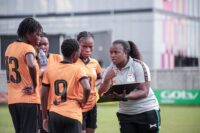Oxfam says Zambia’s mineral resources are only benefiting individuals in positions of influence at the expense of those in communities where they are found.
In an interview, Oxfam southern engagement and influencing head Sonia Kwami said extreme poverty in areas where resources such as minerals were found was a sign that citizens in those areas were not benefiting.
“All we are encouraging is that the mineral revenue sharing system should benefit systems. A lot of people are not benefiting from the resources that Zambia has as a country. Very few, especially though who are in positions of influence are benefiting. So yes, if we look at the communities especially, much as the money comes to the central government, which can be used across board, but it’s important to look at the percentage. How many are benefiting? Some councils have proposed ten percent of the money that come from central government. From whatever money the mines get from their area to actually be invested back. So for me, I don’t have a percentage right now because you need some bit of analysis to do that. But let’s listen to what the councils are saying. Some councils are proposing more than that, but the most important thing is that definitely, your environment is being degraded and all that. You should benefit immensely from mining in your own community. And the resources from the mines should benefit the entire Zambia and not just a privileged few. And it is this money which can help reduce inequality and bring people out of poverty. That is critical,” Kwami said.
“As an organization, it’s not just about mineral revenue sharing alone, its looking at what resources are in a country and how they can be equitably distributed. And so, if we take the case of Zambia, minerals are what you have. And all we are saying is that the communities that mining occurs, the revenue sharing mechanism should benefit them and by way of them being invested in public service like health care, very good education system, improvement in road network and all that. A type of investment that will actually help reduce inequality. A lot of women and children are normally the ones who suffer the most, so if we invest in health care, and better facilities. It is our sisters, our mothers who will benefit. Once they benefit, the whole society benefits because they are the majority. If you have a school system, that a child in a village can compete with a child in Lusaka, in terms of having a high education, then it doesn’t matter which part of the country you come from. So, such a child will not be disadvantaged.”
She said local people deserved to benefit more because they suffered as a result of pollution and other negative consequences of mining.
“We are concerned when the locals are not benefiting. They are the ones affected, they are the ones involved in the actual mining, most of the times they are displaced, and they suffer all the consequences that comes because of mining and so they deserve better. Poor communities in these mining areas are a sign that they haven’t benefitted. It could be because of the way government made agreement with the mining firms but our concern is that at the end of the day activities like these should address challenges in those areas,” said Kwami.












